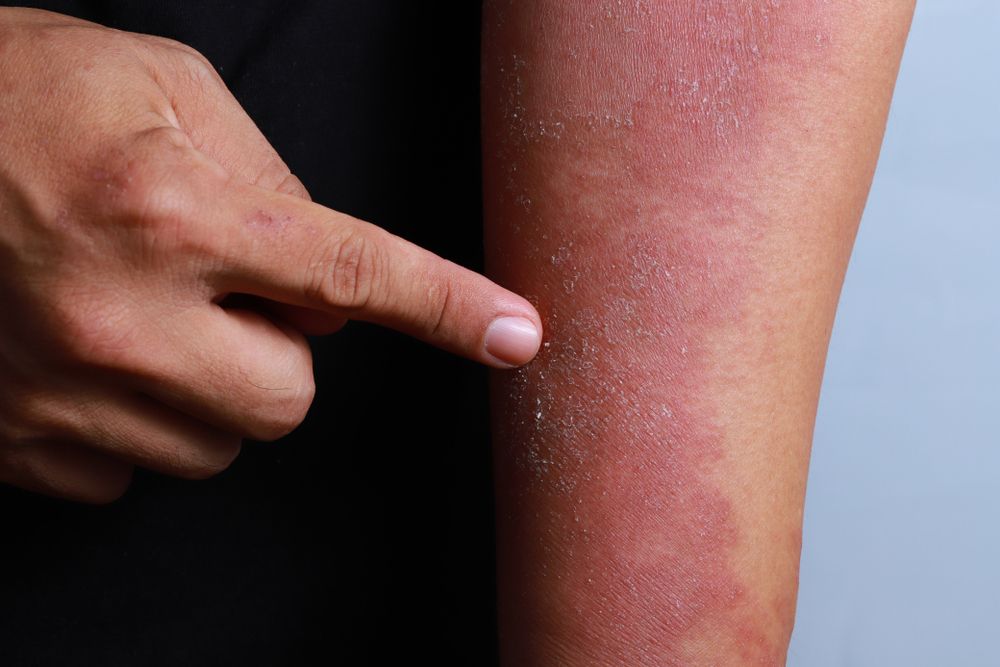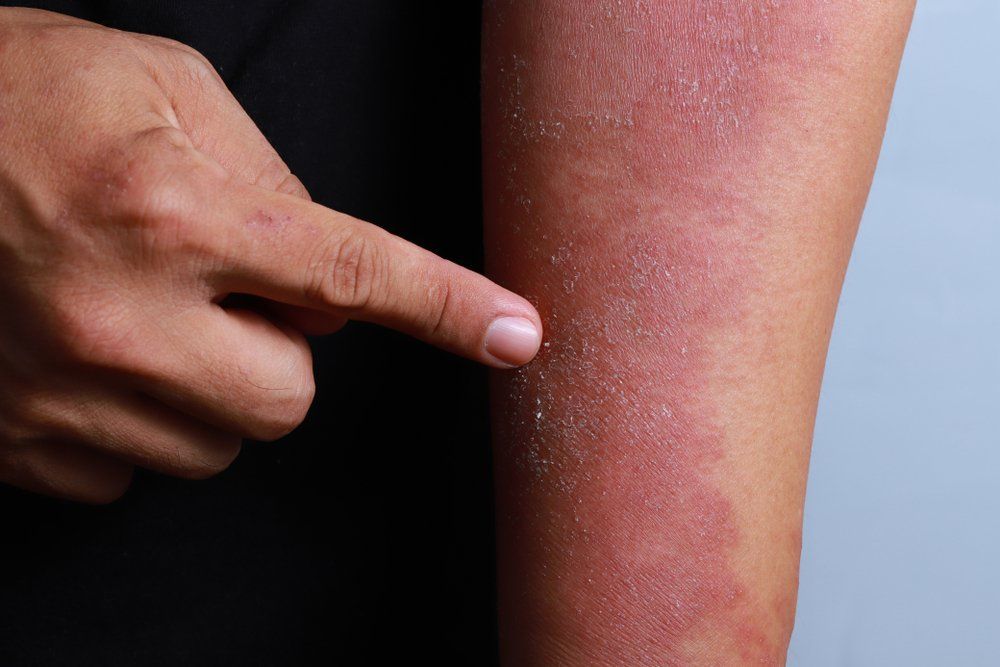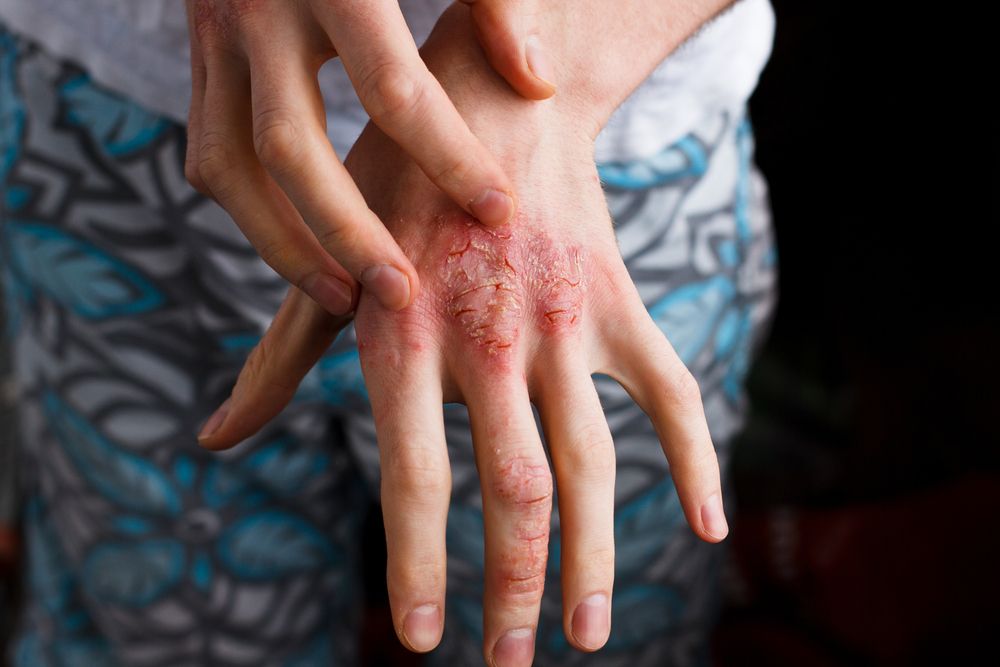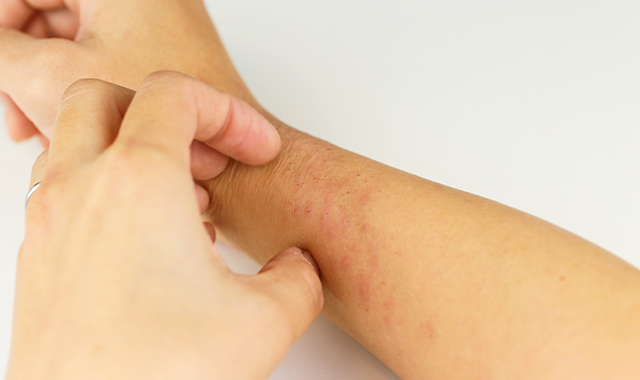- Acne
- Actinic Keratosis
- Aesthetics
- Alopecia
- Atopic Dermatitis
- Buy-and-Bill
- COVID-19
- Case-Based Roundtable
- Chronic Hand Eczema
- Chronic Spontaneous Urticaria
- Drug Watch
- Eczema
- General Dermatology
- Hidradenitis Suppurativa
- Melasma
- NP and PA
- Pediatric Dermatology
- Pigmentary Disorders
- Practice Management
- Precision Medicine and Biologics
- Prurigo Nodularis
- Psoriasis
- Psoriatic Arthritis
- Rare Disease
- Rosacea
- Skin Cancer
- Vitiligo
- Wound Care
Publication
Article
Dermatology Times
It may be time for act two in atopic dermatitis research
Author(s):
For some patients with moderate to severe atopic dermatitis, the combination of dupilumab and corticosteroids may be necessary to control flares, a new study shows. Dupilumab is a proven treatment for AD, so where do we go from here? A physician writing in BJD suggests predictive modeling.
Atopic Dermatitis (©TYLimShutterstock.com)

For some patients with moderate-to-severe atopic dermatitis, monotherapy with a single biologic agent may not suffice. Physicians may add on cyclosporine A therapy, but it too may not lead to an improved condition or it may be contraindicated for some patients.
A new study published in the May 16 issue of the British Journal of Dermatology shows that combination treatment with dupilumab (Dupixent, Sanofi/Regeneron) and topical corticosteroids performed well in a small group of patients.
The treatment regimen improved rashes, itch and the quality of life for patients with moderate-to-severe atopic dermatitis. The study included 325 patients who were treated with both topical corticosteroids and dupilumab for 16 weeks. The patients were divided into three groups: 110 received 300 mg dupilumab onceâweekly, 107 received it every two weeks, and 108 received placebo onceâweekly.
At baseline the Eczema Area and Severity Index (EASI) scores averaged 31 on a scale of 0–72. By week 16, 59-62% of patients treated with dupilumab experienced an improvement in their condition by at least 75% as compared to 29.6% of patients who received a placebo.
WHAT’S NEXT FOR DUPILUMAB?
When dupilumab injection (Dupixent, Sanofi/Regeneron) was approved by the U.S. Food and Drug Administration in March 2017 as the first biologic for adults with moderate-to-severe eczema (specifically, atopic dermatitis), it was one of the most studied treatments for this condition. Its approval was based on the results of three clinical trials that included 2,119 adult patients whose symptoms could not be controlled by topicals. By comparison, 1,653 patients were included in 34 clinical trials of other systemic treatments (ciclosporin, azathioprine, methotrexate, mycophenolate and systemic glucocorticosteroids) for moderate-to-severe atopic eczema.
In an editorial that accompanied the study, Jochen Schmitt of the Center for Evidence-Based Healthcare in Dresden, Germany, asks what’s next for dupilumab. In addition to long-term studies, safety trials of large groups of patients and “real-world health economic investigations,” more quality of life studies may be warranted, he said.
“Electronic patient-reported symptom monitoring may also be an effective way to improve the medical care of patients with atopic eczema and other chronic skin diseases and should therefore be subject to future investigations,” Dr. Schmitt said.
Future studies should also explore the possibility of other indications for dupilumab, treatment duration and discontinuation of biological therapy, the need for new or conventional therapies, and the development of treatment decision aids for patients, he wrote.
With an abundance of research data available on dupilumab, now may be the time to delve into predictive modeling research, he said.
“Driven by more and more powerful information technology, predictive modelling and learning computer algorithms, individualized care and precision medicine no longer appear to be a vision, but rather a realistic scenario to be reached in the near future,” Dr. Schmitt wrote in his editorial.
REFERENCES
M. de BruinâWeller, D. Thaçi, C.H. Smith, et al. "Dupilumab with concomitant topical corticosteroid treatment in adults with atopic dermatitis with an inadequate response or intolerance to ciclosporin A or when this treatment is medically inadvisable: a placeboâcontrolled, randomized phase III clinical trial (LIBERTY AD CAFÃ)." First published: 16 May 2018. British Journal of Dermatology. https://doi.org/10.1111/bjd.16623
Jochen Schmitt. "After the approval of dupilumab for moderate-to-severe atopic dermatitis: what is next on the research agenda?" First published: 16 May 2018. British Journal of Dermatology. DOI: 10.1111/bjd.16505

Newsletter
Like what you’re reading? Subscribe to Dermatology Times for weekly updates on therapies, innovations, and real-world practice tips.


















